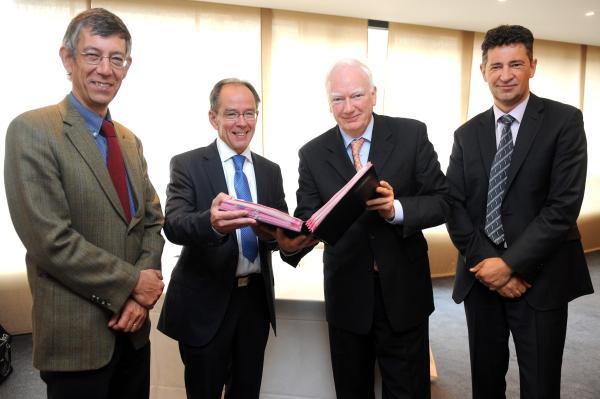
The European Investment Bank (EIB) has joined forces with the Université Catholique de Louvain (UCL) to support a major investment programme, planned by UCL for the period up to 2005 in order to modernise some of its teaching and research infrastructure and construct student accommodation. The scheduled investments amount to EUR 170m, of which EUR 100m has already been the subject of a decision by the Board of Directors. The EIB finance contract for EUR 80m was officially signed on Monday 16 May 2011 in Louvain-la-Neuve in the presence of Bruno Delvaux, Rector of the UCL, and Dominique Opfergelt, Director General of the UCL.
This collaboration represents a first in the area of education in Belgium’s French-speaking Community, for both the EIB and the UCL.
UCL’s property investment programme is fully consistent with the European Union's objectives aimed at establishing a knowledge economy in Europe, which is vital for restoring growth and the reason why the EIB, the EU’s financial institution, supports university investments. The construction and renovation schemes planned by UCL are targeted ultimately at improving research and education, but also at reducing its CO2 emissions in order to meet the relevant EU requirements (which is also an EIB lending priority).
In concrete terms, UCL’s investment plan covers in particular (i) the renovation of a series of buildings including new lecture and practical work facilities for architecture students in Brussels (Saint-Gilles), agronomic greenhouses for the science and technology faculty, chemistry laboratories (Lavoisier) and the Place des Sciences, as well as (ii) the construction of student accommodation and a new science and health tower in Woluwe. A new combined heat and power plant and the insulation of some roofs and façades will contribute to improving energy efficiency. The overall programme represents a hefty EUR 170m financing operation, two-thirds of which is dedicated to renovation schemes and one-third to new facilities: an investment for the future founded on the partnership with the EIB on keen lending terms and with a long maturity.
The Rector of the UCL, Bruno Delvaux, commended the partnership established with the EIB: “This collaboration will help UCL perform its three main tasks as effectively as possible – education, research and service to society. The loan will enable UCL to address the lack of accommodation and to modernise some of its teaching and research infrastructure. It will contribute to enhancing the quality of our teaching and research, thereby raising the profile of our university on regional, national and international levels. Thanks to this partnership, the university will be in a position to fulfil its academic remit under better conditions than those that exist today. The partnership with the European Investment Bank is also a sign of confidence in our university’s day-to-day investment in scientific progress, the education of young people and the development of our society. Moreover, it is an acknowledgement of our sound management”.
For his part, EIB President Philippe welcomed this operation with UCL, a centuries-old world-class university: “Although, like its counterparts throughout Europe, it has always played a pivotal role, it has become even more important in this decade of infinite dangers and possibilities, since it is excellence in the fields of education and training, the quality of researchers and their ability to shift technological frontiers, our capacity for innovation and the rapid diffusion of these innovations throughout the economy that form the basis of the European continent’s growth potential which will be crucial for generations to come. "
This is the scenario that the European Council wishes to initiate with the "Europe 2020" strategy which aims to hone the development potential and competitiveness of the EU through "intelligent, sustainable and inclusive growth”. Support for this strategy is a priority of the EIB: accordingly, the Bank channelled over EUR 4bn into higher education projects and more than EUR 7bn into research and development projects in 2010.
In Belgium, in the same year the EIB lent some EUR 1.7bn, notably for a health, education and research project, the “Health Science Campus” of the Katholieke Universiteit Leuven (KUL) and the University Hospital of Leuven (UZ Leuven), as well as for the R&D programme of the Agfa Healthcare company.
UCL is one of Europe's oldest universities (1425). It offers 27 289 students of 119 nationalities hundreds of courses covering all academic disciplines. According to the QS World University Rankings (2010), it is the top university in the French Community of Belgium.

Photographer: EIB ©EIB
Download original